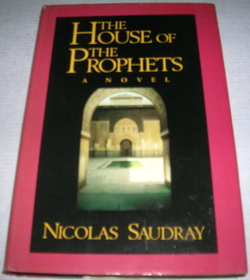 Of all the foes facing the U.S., perhaps none seem more mysterious than the radical fundamentalist Moslems. Why, starting with the Tehran embassy takeover in 1979, have these people repeatedly abducted and killed innocent Americans? Why do they so hate the U.S.?
Of all the foes facing the U.S., perhaps none seem more mysterious than the radical fundamentalist Moslems. Why, starting with the Tehran embassy takeover in 1979, have these people repeatedly abducted and killed innocent Americans? Why do they so hate the U.S.?
Actually, the fundamentalists themselves are not mysterious. They publicly proclaim their vision of a society run according to the Islamic sacred law. They tell anyone who will listen why they see the U.S. as the main obstacle to applying this law. The trouble is, Westerners are so secularized, they do not believe that anyone really wants to live by a 1,000-year-old code of religious law. We are baffled by the fundamentalists because we do not take them at their word.
I have often hoped a talented novelist would write about the fundamentalists and persuade Westerners to take their religious goals seriously. It was therefore with special enthusiasm that I read The House of the Prophets (Doubleday, 254 pages, $15.95) by Nicolas Saudray. In addition to telling a subtle and absorbing story - superbly translated from the French by Julia Allen - Mr. Saudray conveys the spirit of fundamentalist Islam. His light and skillful touch succeeds in making this extraordinary phenomenon comprehensible.
The story centers on a Christian architect, Gabriel, who returns to the Middle East from several years in the U.S. His native Marsania (a fictional country the author describes as a synthesis of Egypt, Lebanon, Syria and Iraq) has many religious and ethnic groups and a long tradition of tolerance among them. When Gabriel left, harmony had still prevailed. "In those days there was little talk of oil. It was before the Muslims realized they were the most blessed of men."
But along with the oil boom has come the rise of radical fundamentalist Islam. Feeling a new confidence, the fundamentalists argue that "Christianity has had its day. ... The world is turning away from it." Christians tacitly agree, saying that God has "gone over to the other side." Radical fundamentalists reject the old ways of live-and-let-live. They now insist on everything being done their way. Communal tensions increase, outbreaks of violence become common.
Gabriel encounters the radicals at every turn: They close the mosques to him, they sabotage the hotel he is designing, and they blow up his beloved Chapel of the Transfiguration. Their gains also touch everyone close to Gabriel, invariably for the worse. His mother turns into a morbid recluse. His cousin joins the violent Christian underground. His future father-in-law resorts to amoral appeasement.
But the central theme of the book involves the tension between Gabriel and his Moslem friend from childhood, Ruwan, the fundamentalists' new leader. Islam instills an absolute certainty in Ruwan, an unbreachable wall of fundamentalist resolve. Mr. Saudray calls it "Islam's incredible clear conscience." Fundamentalists have so much faith and purpose that none of their opponents - Christian, Moslem, or anything else - can match them. From this comes their power and their menace.
Gabriel both despises and envies Ruwan's assurance. For his own part, he experiments with a range of responses to fundamentalist power. Initially he puts all his hope in building a mosque, the House of the Prophets named in the book's title, which he hopes will improve Christian-Moslem relations. He then toys with the idea of converting to Islam and is dismayed to see how this once-shocking idea meets with shrugs even among Christians. He creates an alliance between the Christians and another of the minority sects in Marsania. Out of despair, he finally joins the Christian underground.
All Marsania in some way shares Gabriel's despair. The prime minister, a politician schooled in the old ways of deal-making and getting by, expresses the problem metaphorically: The many ethnic and religious groups in the Middle East resemble differently colored yarns in a tapestry. Before the rise of fundamentalist Islam, the yarns were woven together, but the colors never ran. "Their contrasts highlighted their beauty." But fundamentalism destroyed the old tolerance and the tapestry cannot survive. "The Muslim thread came out of the weft. The fabric has gradually been coming undone."
The anti-Christian sentiment in the fictitious Marsania is only a step removed from the spirit that motivated the actual killing of two American accountants traveling on a Kuwaiti airplane in December 1984, the TWA hijacking in June, and the destruction of a Northwest Orient Airlines office in Copenhagen last month. It fits with the abduction of eight Americans living in Lebanon and the bombing of a Spanish restaurant frequented by American soldiers. It explains the assassination of Malcolm Kerr, president of the American University of Beirut, and the bombing of U.S. embassies in Beirut and Kuwait.
Like Gabriel, the U.S. is experimenting with a variety of responses to radical fundamentalist aggression; like Gabriel, it is slowly concluding that nothing works but response in kind.
Mr. Pipes teaches at the U.S. Naval War College and is the editor of the Harvard Middle East Papers.